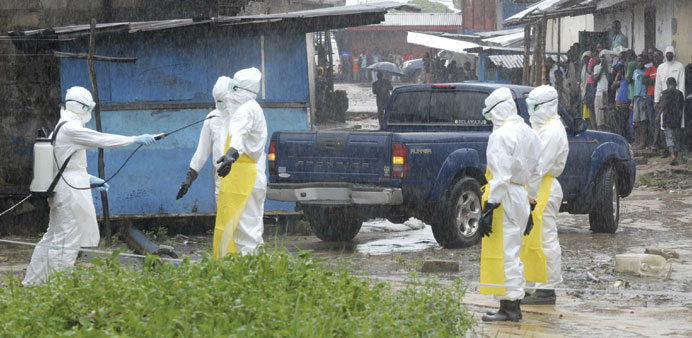Health workers disinfect themselves before collecting a corpse exhibiting Ebola symptoms abandoned at Duwala market in Monrovia.
By Terence Sesay and /Kristin Palitza, DPA/Monrovia
When Joseph Tandanpolie’s son died, nobody came to the funeral.
His son, William, was a doctor, well-liked and respected. But when he contracted Ebola, family and friends stayed away, too afraid of coming into contact with the virus.
“It’s disheartening,” said Tandanpolie, 64, who lives in Liberia’s capital, Monrovia.
“I have not visited Mr Tandanpolie to sympathise with him for fear that he and other members of his family might be infected, especially as he is said to have taken care of his son while he was sick,” explained neighbour Jackson Saysay.
Funerals have become lonely affairs in Liberia, where 834 suspected and confirmed Ebola cases have been reported, according to the World Health Organisation, of which 466 people died.
Eight of Liberia’s 15 counties have now registered cases, the health ministry said.
“The situation is very scary. You receive death news as soon as you wake up,” said Fatu Ibrahim, a housewife in Monrovia.
Others say living in Liberia is “like being at civil war” again.
“The situation is similar to the war we fought in the 1990s.
No one knows what will happen to them the next day,” said Thomas Quiah.
As overburdened health authorities struggle to respond to calls, dozens of sick patients continue to be treated at home until they die.
At night, relatives dump the disease-ridden bodies on street corners.
It can take up to three days for a corpse to be picked up, residents said.
The health ministry lacks ambulances and personnel, and there are few Liberians willing to do the job.
Even in one of the busiest streets in central Monrovia, it took officials 48 hours to collect a corpse, despite repeated calls to the government hotlines, local newspaper Front Page Africa reported.
Mabel Saybay, a 45-year-old nurse, tells DPA of children being abandoned after their parents die of Ebola.
Two sisters, aged five and seven, were forced to sleep in the rain outside their house for days, until someone alerted a health worker who brought the girls to an isolation centre, said Saybay.
President Ellen Johnson Sirleaf’s government is scrambling to get the Ebola outbreak – which has killed more than 1,200 in West Africa – under control.
Residents say that efforts to trace people who have come into contact with infected patients are slow.
Prevention measures are often inadequate.
Numerous travelers report the fever thermometers at the airport do not work correctly.
One passenger, who did not wish to be named, told DPA that even though his temperature read 30 degrees Celsius at Monrovia’s Roberts International Airport, the official waved him through.
“I told him: Well, it seems I’m already dead! He just smiled and waved,” he recalled.
Another Liberian said that three nurses were taking the temperature of dozens of travelers at a checkpoint between two counties with old mercury thermometers.
The thermometers were placed in peoples’ mouths or under their armpits without being disinfected in between, while the nurses did not wear protective clothing.
The government’s desperation perhaps became most clear earlier this week, when it ordered its armed forces to shoot people trying to illegally enter the country from neighbouring Sierra Leone.
Many Liberians have turned to the only thing they believe can save them: God.
Despite health authorities’ instructions to avoid large gatherings, churches and mosques are crowded.
Worshippers, however, have stopped shaking hands and started to dress in long sleeves to avoid skin contact.
Buckets filled with chlorinated water to disinfect hands are placed at the entrances.
Whoever is able, leaves.
Foreign firms, including mining giants ArcelorMittal and China Union, have scaled down operations and evacuated their staff.

